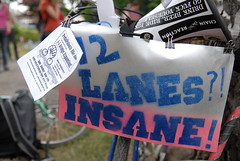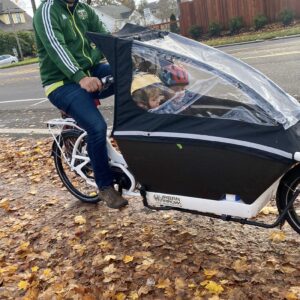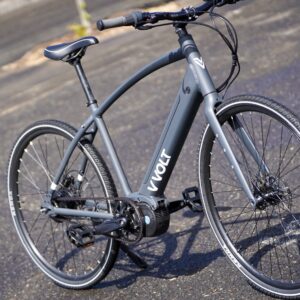House Bill 2800 — and in some ways the future of Columbia River Crossing project — is up for another hearing at the state capitol on Monday. Activists against the project, who packed hearing rooms this past Monday, hope for a repeat performance in order to “make sure the narrative remains on our side.”
Others see Monday’s hearing as a “last chance” effort to stop the bill. If passed, HB 2800 would declare that it’s in Oregon’s state interest to fund and move forward with the project. The bill would free up the bonding and tolling authority necessary so the state can come up with its share — $450 million — of the project’s $3.6 billion price tag. But critics call the bill a “blank check” that unleashes a series of scary financial obligations.
“This could be our last chance and a huge turnout could be the only thing to stop it. This could be it.”
— Dan Kaufman
Regional political action committee Bike Walk Vote is organizing carpools from Portland to Salem via Facebook. The Northeast Coalition of Neighborhoods, an umbrella group that represents 12 Portland neighborhood associations, is urging their members to contact legislators to voice concerns. They sent out an email blast today stating that the NECN, “holds the position that the the Columbia River Crossing project is a costly, risky highway mega-project that would be bad for our neighborhoods and for all Oregonians… We need to keep up the pressure.” (Read more about NECN’s position.)
Monday’s hearing will also likely be the first time we hear from the newly formed “bipartisan coalition” against the project that includes such diverse interests as the Coalition for a Livable Future and the Cascade Policy Institute.
Dan Kaufman, a citizen activist who’s been working to thwart the project for years, shared with us that, “This could be our last chance and a huge turnout could be the only thing to stop it. This could be it.”
While the politics of the CRC still look good for project backers here in Oregon, the picture just keeps getting worse in Washington. The Willamette Week reported today that a Washington state rep wants a re-design. Regardless of the merits of that lawmakers request, it looks increasingly unlikely that Washington will vote in support of the project during this year’s legislative session. Whether that fact impacts the urgency Oregon lawmakers feel around HB 2800 remains to be seen.
The hearing will take place Monday (2/18) at 3:00 pm in front of a 16-member House Joint Committee on the I-5 Bridge Replacement Project. I plan to attend so stay tuned for more coverage.






Thanks for reading.
BikePortland has served this community with independent community journalism since 2005. We rely on subscriptions from readers like you to survive. Your financial support is vital in keeping this valuable resource alive and well.
Please subscribe today to strengthen and expand our work.
This is probably a stupid question but here goes. So, the Feds share of the funding is 50%, and OR and WA are to split the other half. That means that $450M is 1/4 of the funding, or $1.8B total (OR+WA+Fed). Ignoring debt service and near-certain cost overruns, where does the other $1.8B (3.6-1.8=1.8) come from?
Not a stupid question. Answer: tolling and magic fairy dust. I mention the magic fair dust because the tolling plan is deeply flawed:
http://www.oregonlive.com/environment/index.ssf/2011/07/columbia_river_crossing_has_a.html
-VMT has decreased every year since 2004
-No plans to toll I-205, so traffic will divert
-WSDOT has already cut their expected tolling revenue for the Alaskan Way Viaduct replacement in half. Doesn’t bode well for the CRC tolling projections…
My understanding is that the funding is supposed to be broken up in thirds: 1/3 from the feds, 1/3 from tolling, and 1/3 from the two states combined.
Here’s what I don’t get: if the total is supposed to be 3.6 billion, a third will be 1.2 billion. Meaning the states should be splitting the 1.2 billion, meaning each of the two states’ shares should be $600 million. So why are we hearing that this $450 million will cover Oregon’s share?
To remind people, this isn’t a bill allowing Oregon to come up with “just” $450 million.
It’s a blank check so Oregon can spend whatever they want to. Given there’s already a $400 million hole in the financing for the project, and the traffic projections are based on $1.10 gas, and WSDOT’s tolling projections on the Seattle tunnel and Tacoma Narrows Bridge have been wildly off, and ODOT’s projects tend to triple in cost, don’t think this is about “just” $450,000,000.
All evidence is it will cost a lot more than that.
The bill says this: “the State Treasurer may not have
outstanding, at any one time, bonds in an amount exceeding $450
million” — so all you do is pay off some bonds and issue new ones; it’s a revolving $450 million slush fund until the cows come home.
And to those who think the cost cap for the project is real, look at any other transportation mega-project ODOT has done recently. The political forces change once a project is started, and no one puts up with a half-done project.
There goes my Oregon tax kicker check.
FOREVER.
Alan – the hope is tolls ($1.3 billion) and federal highway money ($400 million). But those are highly unlikely; the federal highway money pot has $500 million TOTAL for all of America. The hundreds of millions of dollars in financing gaps (plus the cost overruns) will be born by, well, you know who.
And the toll projections are iffy; there’s a huge record of WSDOT and ODOT toll projections being WAY off; the models for the project weren’t built to handle tolling. http://www.blueoregon.com/2013/02/pt-barnum-right-crc-boondoggle/
Thanks, Evan. “Boondoggle” for sure!
We will want to look in to the minimum allowable bike & pedestrian accommodation allowed by Oregon, Washington and federal law regarding this bridge project.
Also that “hole in the air” that prevents lane and width reductions relative to commercial trucks; it may be vague enough to mandate/require at least equivalent accommodation.
ALSO: if they try to completely eliminate bike facilities I’d look into extreme applications of the Oregon law requiring bike lanes on new roads.
If they force this through and try to to eliminate bike and led access the city, port authority and ODOT should found on some fairly ugly civil disobedience and even uglier lawsuits.
… Should COUNT on some fairly ugly civil disobedience and even uglier lawsuits.
There’s a growing group of people who plan to bike to Salem and back for the CRC hearing on Monday. Meetup is 9am at Tiny’s Coffee at SE 12th & Hawthorne. Low chance of rain. Bring a spare tube, water, and snacks. Shift posting is here: http://www.shift2bikes.org/cal/#18-3462
Please pass the bill so we can begin building the bridge. I take comfort in knowing that nine times out ten, politics follows the money. The economy of the I5 corridor depends on this project. I have far more cycling miles in my legs than driving miles, but that doesn’t make the current CRC bridge look like the Golden Gate.
Marid,
You wrote, “The economy of the I5 corridor depends on this project.”
How so?
News Flash! We already have an I-5 bridge over the Colombia river. In fact, we have 4 bridges: I-5 N/S & I-205 N/S.
When driving my freight laden 53′ tractor-trailer through Portland by way of an I-5 routing I prefer I-205 in all circumstances other than middle of the night.
Even if there is an accident on the 205,
Even if there is construction,
Even if major police enforcement action,
Even if it is all of the above.
It is a longer distance but there are fewer oddball/dangerous on&off ramps and overall average speeds are better on I-205 under all situations other than completely empty roads.
But freight companies only see fuel costs from a slightly more costly route.
The solution is simple: raise the cost of using I-5 for gigaton freight shipping.
If we can’t toll the bridge, toll I-5 from the bridge south: from what I’ve seen toll booth waiting lines should be quicker even without a reduction in traffic.
Does the bridge design meet Coast Guard specification? Bridge height seemed like a deal breaker before and yet I see no mention of the Coast Guard’s response to the Navigation Impact Report that was supposedly submitted by CRC staff January 2013.
The coast guard may be forced by the white house to accept the bridge height. There will be additional costs in buying off the companies directly affected and unknown losses because no new business that need a higher bridge clearance will build east of the bridge.
The fact they never even considered river navigation is the height of ineptitude.
and goes comment Marid made above: so, what about the Columbia river shipping corridor?
I don’t like to think about the Coast Guard being pushed, particularly if political expediency means decreasing safety margins or compromising future economic development associated with Columbia River navigation.
CRC documents demonstrate they considered current river navigation and name the specific vessels which will no be able to pass under the proposed bridge. However, I don’t see the mitigation costs estimated based on their stated options (below) or included in the budget (cost-shift or a surprise for tax payers?). It is interesting to see the shift in the vision of Columbia River navigation — it now seems we wasted money building the 205 bridge too high.
POSSIBLE MITIGATION OPTIONS
• Permanently reconfigure highest vessel elements such as mast, masthead, antenna or crane gantry
• Temporarily dismantle/remove highest elements such as spuds, boom or gantry for passage
• For owners with multiple vessels, use vessels that can pass under the bridge (crane barges)
• Permanently locate vessel to one side of bridge
• Replace or acquire vessel
• Transport vessel by land around bridge (sailboats) as needed
• Relocate owner’s operation downstream
• Compensate owners for business loss
And what about Capizzi’s bike commute route along Marine drive/Kelly Point? It will probably be a really nice ride after they finish with the demolition of the current bridge, estimated to be start in 2020.
” I take comfort in knowing that nine times out ten, politics follows the money.”
There you have it folks, the CRC supporters giving away the game.
http://www.blueoregon.com/2013/02/pt-barnum-right-crc-boondoggle/
I am against the CRC. But other issues have driven a giant wedge among
Portlanders- such as the destruction of old neighborhoods- so I can’t work with you guys. Have fun on your bike ride to Salem. The people divided are easily defeated. Signed- an incumbant landowner who dared to have two kids & got a “real” job.
I will bike across I-5 boones bridge today in a silent protest of more bike related INFRA for modes of transport. if we keep building more lanes for cars it will not solve the problem, but if we make something that is workable if moves ppl safer and better.
maybe not since the sholder lane is filled with junk. 🙂 sorry about typo